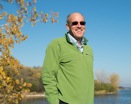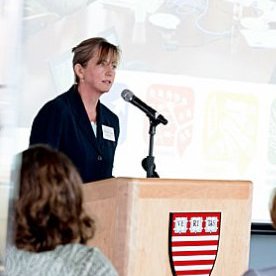Charles Driscoll and Kathy Fallon Lambert presebted the results of an ongoing project on co-benefits associated with policies to control carbon dioxide emissions from electric utilities by a boundary-spanning organization, the Science Policy Exchange. Carbon dioxide emissions standards for U.S. power plants will influence the fuels and technologies used to generate electricity, altering emissions of pollutants and affecting ambient air quality and public and ecosystem health. Three alternative scenarios for U.S. power plant carbon standards were evaluated for changes in fine particulate matter (PM2.5) and ozone concentrations in ambient air, and resulting public health and ecosystem co-benefits For two of the three policy scenarios, carbon standards for existing power plants can substantially decrease emissions of co-pollutants, and improve air quality and public health beyond existing air quality policies. A stringent but flexible policy that counts demand-side energy efficiency toward compliance yields the greatest health and ecosystem benefits, and a favorable benefit-cost analysis. The magnitude and the nature of the co-benefits associated with this policy were highly distributed spatially with all of the coterminous states receiving some health benefits and many states experiencing ecosystem benefits. Their work involves an evaluation of options considered for implementation of the U.S. Environmental Protection Agency Clean Power Plan. In addition to the presentation on co-benefits, there was a discussion of the Science Policy Exchange and the outreach effort associated with the project.
U.S. Power Plant Carbon Standards and the Potential for Clean Air, Human Health and Ecosystem Co-benefits
Department of Civil and Environmental Engineering, College of Engineering and Computer Science, Syracuse University
Charles T. Driscoll is a Distinguished and University Professor at Syracuse University. He received his BS from the University of Maine and MS and PhD from Cornell. Driscoll’s research addresses the effects of disturbance on forest, freshwater and marine ecosystems, including air pollution (acid and mercury deposition), land-use, and climate change. Driscoll has testified at Congressional and state legislative committee hearings, and served on many local, national and international committees. He is a member of the National Academy of Engineering.
Science Policy Exchange, Harvard Forest, Harvard University
Kathy Fallon Lambert directs the Science Policy Exchange and the Science & Policy Integration Project at the Harvard Forest, Harvard University. The Science Policy Exchange is a consortium of six universities and research institution (including Syracuse University) working at the science-policy interface to enhance the influence of science on environmental decision-making. Previously, Kathy was the executive director of the Hubbard Brook Research Foundation (HBRF) where she helped develop the Science Links program to bridge the gap between long-term biogeochemical research and related public policy. Kathy has collaborated with Dr. Charles Driscoll, Syracuse University Professor of Environmental Systems Engineering, on three high-impact projects that link science with policy: Acid Rain Revisited, Mercury Matters, and Co-Benefits of Powerplant Carbon Standards. Kathy holds a B.A. from Dartmouth College and an M.F.S. from the Yale School of Forestry and Environmental Studies. She is a Switzer Fellow, Leopold Schepp Scholar and recipient of the U.S. EPA Environmental Merit Award.
SyracuseCoE offers regularly scheduled forums and networking showcasing innovative research, technologies and other opportunities of interest to stakeholders and community members. Past topics have included groundbreaking industry projects to modernize the HVAC systems at the Sistine Chapel, workshops to help state agencies develop funding priorities, and research on the impact of “green” buildings on cognitive function. To receive notice of these events, sign up for email updates at the “Join our mailing list” tab at the bottom right corner of the website. Visit the Research & Technology Forum page to see the archive.


